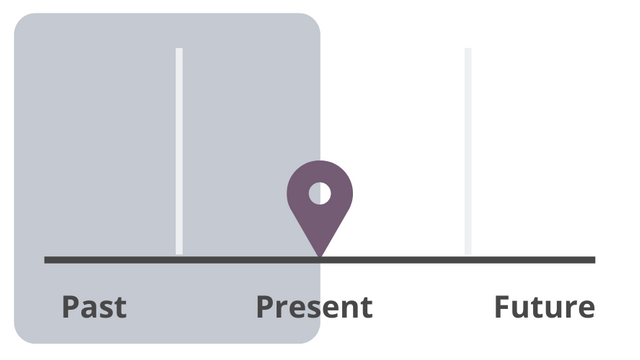Tip: use www.wordreference.com to conjugate verbs or translate a tricky word.
Past Simple
This is the basic past tense. It’s used whenever we want to talk about the past and there isn’t a special situation that means we should use the past perfect, present perfect or past continuous. People love to talk about past memories and experiences, so this is a tense to master if you want to start having more conversations in English!
- Signal Words
- yesterday
- last…
- …ago
- in 2005
- Use
- Finished action in the past. No connection to the present.
- Structure
- regular: infinitive + ed
- many verbs are irregular! be/been, do/done
- Affirmative
- I worked at the mall last year.
- He went to France last month.
- Negative
- She didn’t work yesterday.
- They didn’t go on vacation in 2005.
- Question
- Did you work last weekend?
- Did you guys go to that concert?
More Examples:
He talked to his friend.
They had dinner at an Italian restaurant.
She did the laundry last night.
I said I’m sorry.
Practice Exercies
Past Continuous
Just like the simple past, this tense is very useful for conversation and sounding more natural in English.
- Signal Words
- while
- when
- Use
- When you don’t know if an action is finished or not, or it was still in progress at certain time in the past.
- Two actions happening at the same time, that don’t influence each other.
- Structure
- was/were + infinitive + ing
- Affirmative
- I was watching a movie last evening.
- They were relaxing while I was studying for an exam.
- Negative
- She wasn’t doing her homework last night.
- They weren’t watching news that morning.
- Question
- Were you driving when I called you?
- Was he helping when you guys were cooking dinner?
More Examples
While we were having dinner the phone rang. (past continuous + past simple)
Andrew was always coming to work late. (past repeated actions)
Practice Exercises
Past Perfect
We don’t use the past perfect all the time in English, but it is useful, and it sounds very good if you can use it correctly. Once you master the past simple, it’s pretty easy to learn this one.
- Signal Words
- already
- just
- never
- Use
- When one activity happened before another activity in the past. (past perfect + past simple)
- The two actions are usually related to each other.
- Structure
- had + past participle
- Affirmative
- Jane had read the book before she watched the movie.
- I had already lived in three countries before I met you.
- Negative
- She hadn’t tried skiing before she travelled to Switzerland.
- They hadn’t done their homework before class.
- Question
- Had you studied much English before you moved to Australia?
- Had they been friends before they started dating?
Tip
Try to picture the actions on a timeline. Which one happened further in the past? That one takes the past perfect.
Practice Exercises
Past Perfect Continuous
This tense is a little less common, but native speakers still use it to describe the order or duration of events more precisely. This is a good one to understand to improve your reading and listening comprehension. Advanced students should learn how to use this tense correctly.
- Signal Words
- how long
- since
- for
- Use
- When an action started in the past and continues up until another time in the past. The activity does not continue until now, it stops before the second event.
- Shows how long something had been happening before something else happened.
- Structure
- had + been + infinitive + ing
- Affirmative
- She had been working for years before she got a promotion.
- They’d been relaxing in the park when it started to rain.
- Negative
- He hadn’t been running for long when he started to feel tired.
- They hadn’t been dating long when they decided to move in together.
- Question
- Had you been studying a long time before you took the exam?
- Had they been playing football outside when the rain started?
Tip
This similar to the past perfect, but instead of two finished actions, one event is still in progress up until the other event starts.
Practice Exercises
